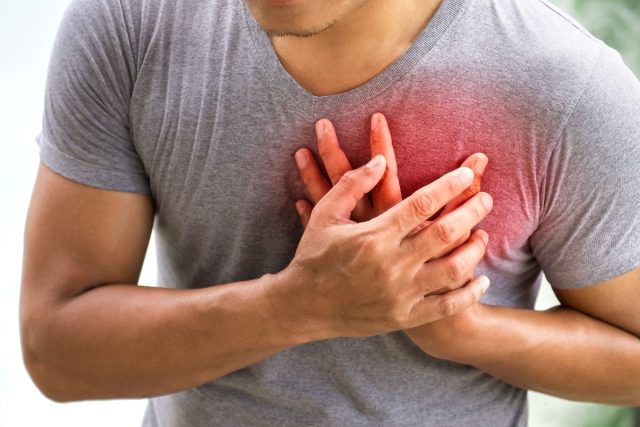Although heart disease is the leading killer for men and women in the United States, it can be avoided in many cases. Having healthy habits like not smoking, exercising 150 minutes a week and a clean diet can help prevent heart disease. However, also knowing the signs of when your heart isn't healthy is vital and can be a lifesaver since early detection increases the chances of survival. Eat This, Not That! Health spoke with Dr. Tomi Mitchell, a Board-Certified Family Physician with Holistic Wellness Strategies who shares signs your heart is not working correctly. Please consult your physician for medical advice.
Our Heart is Amazing

Dr. Mitchell says, "The heart is a vital organ that plays a critical role in our lives. Blood pumping around the body transports oxygen and nutrients to the cells and removes waste products. The heart can function without us being consciously aware of it – we don't have to remind our hearts to beat. This is because the heart has an electrical system that controls the rate and rhythm of the heartbeat. The electrical impulses generated by the heart are conducted through the heart muscle, causing it to contract and pump blood. The electrical impulses are also transmitted to the brain, where they are interpreted as a heartbeat. In addition to its role in circulation, the heart also plays a vital role in regulating blood pressure and fluid balance in the body. The heart is a powerful symbol of love and emotional connection, and its importance to our health and well-being cannot be overstated."
Detecting Early Signs of Heart Disease is Essential

Dr. Mitchell emphasizes, "The human heart is a fantastic thing. It's responsible for pumping blood around our bodies, delivering oxygen and nutrients to our cells, and removing waste products. However, despite the heart being fantastic, there are situations when it doesn't perform correctly. Our body can give us warning signs, and as such, we must know how to recognize signs that the heart isn't functioning as it should be. One of the most common warning signs of heart problems is chest pain. This can feel like a tightness, heaviness, or pain in the chest and may be accompanied by shortness of breath, nausea, and sweating. If you experience any of these symptoms, seeking medical help immediately is essential, as they could indicate a heart attack. Other warning signs of heart problems include dizziness, lightheadedness, fainting, and irregular heartbeat. If you experience any of these, you must seek medical advice as soon as possible. While many heart problems are severe, if they're caught early enough, they can often be treated successfully. So, if you think something might be wrong with your heart, don't delay in getting it checked out."
Shortness of Breath

According to Dr. Mitchell, "Shortness of breath, or dyspnea, is a common symptom of many heart conditions. The heart cannot pump enough blood to meet the body's oxygen demands. This can cause fluid to build up in the lungs, making breathing difficult. In some cases, shortness of breath may also be caused by an obstructed airway. However, the most common cause of dyspnea is heart failure. Heart failure occurs when the heart muscle is unable to pump blood effectively. This can cause a build-up of fluid in the lungs, as well as other parts of the body. Symptoms of heart failure include fatigue, edema, and, of course, shortness of breath. If you are experiencing shortness of breath, it is essential to see a doctor so that they can determine the underlying cause."
Persistent Cough

Dr. Mitchell tells us, "A persistent cough can signal that the heart isn't working correctly. When the heart doesn't pump blood as efficiently as it should, the lungs can fill with fluid, making breathing difficult. The extra fluid in the lungs also puts pressure on the airways, which can trigger a cough. In addition, heart problems can cause lung inflammation, leading to a cough. Therefore, you must see a doctor to rule out any potential heart problems if you have a persistent cough. While a cough itself is not usually indicative of a severe problem, it can be a sign of an underlying condition that needs to be treated."
Swelling in the Legs, Ankles, and Feet

"Many people are familiar with the common symptom of hand and foot swelling," says Dr. Mitchell. "When this occurs, it is often the result of excess fluid retention or edema. Edema can be caused by various factors, including pregnancy, menstrual cycles, medications, and standing for long periods. However, edema can also signify more serious problems like heart failure. When the heart is not pumping effectively, blood can back up in the veins and cause fluid to leak out into the tissues. This can lead to swelling in the extremities. Swelling accompanied by shortness of breath, fatigue, and chest pain may be a sign of heart failure and should be evaluated by a medical professional."
Fatigue

Dr. Mitchell explains, "Fatigue is a common symptom of many cardiac conditions. When the heart isn't pumping efficiently, the body doesn't receive the oxygen-rich blood it needs to function correctly. This can lead to feelings of exhaustion and weakness, even when you haven't exerted yourself physically. In some cases, fatigue may be the only symptom of a heart problem. For example, you must see a doctor for evaluation if you're experiencing fatigue that interferes with your daily activities. While other health conditions can cause fatigue, it's essential to rule out any potential cardiac causes. With proper diagnosis and treatment, many people can manage their cardiac disease and live a whole and active life."
Dizziness or Lightheadedness

Dr. Mitchell states, "Dizziness or lightheadedness can indicate that the heart isn't working correctly for several reasons. First, the heart isn't pumping blood as efficiently as it should, which can lead to low blood pressure. This can cause dizziness or lightheadedness because there isn't enough blood flow to the brain. Additionally, an irregular heartbeat can also cause these symptoms. If the heart is beating too fast, it may not be able to pump enough blood to the brain. On the other hand, if the heart is beating too slowly, it can cause a drop in blood pressure and result in dizziness or lightheadedness. In either case, it's essential to see a doctor as soon as possible to determine the cause and get the necessary treatment."
Irregular Heartbeat
![]()
"The heart is a muscle that contracts and relaxes to pump blood throughout the body," says Dr. Mitchell. "This pumping action is controlled by electrical impulses that travel through the heart, causing it to beat. An irregular heartbeat, also known as arrhythmia, occurs when these electrical impulses are abnormal. There are many different types of arrhythmia, but they all share one common symptom: an irregular heartbeat. In some cases, an irregular heartbeat may not cause symptoms and may only be discovered during a routine physical exam. However, in other cases, an irregular heartbeat can cause shortness of breath, chest pain, fainting, or even cardiac arrest. An irregular heartbeat is often a sign that the heart is not working correctly and can be caused by various underlying conditions. Therefore, you must see a doctor if you experience arrhythmia symptoms."
Chest Pain

Dr. Mitchell shares, "When the heart isn't receiving enough oxygen, it doesn't pump as efficiently. This can cause chest pain, known as angina. Angina is often described as a sensation of tightness, pressure, or squeezing. It can vary in intensity from person to person and feel different depending on its cause. For example, some kinds of angina are brought on by physical activity and go away when you rest. Other types may be constant or come and go without any particular pattern. For example, if you experience chest pain, it's essential to see a doctor so that they can determine the cause and provide appropriate treatment. In some cases, chest pain may signify a heart attack, so it's essential to seek medical attention immediately."
No comments:
Post a Comment